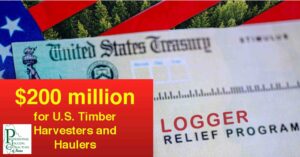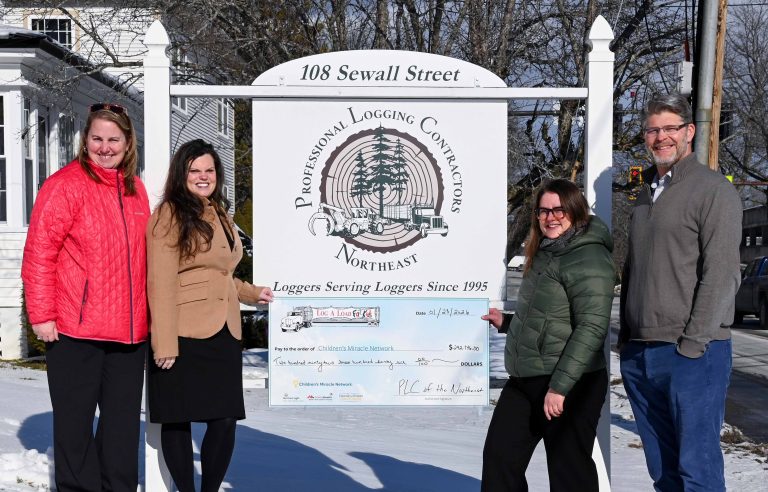Maine loggers praise inclusion of $200 million for timber harvesters and haulers in approved COVID-19 Relief Package
AUGUSTA – The Professional Logging Contractors (PLC) of Maine cheered the announcement late Monday that $200 million in aid for timber harvesters and haulers has been included in an approved bipartisan $900 billion COVID-19 relief package, and credited Maine’s congressional delegation, led by the efforts of U.S. Senator Susan Collins and U.S. Representative Jared Golden, for working to ensure the logging industry was not left out of this latest round of federal assistance.
The aid will go to timber harvesting and hauling businesses that have, because of the COVID–19 pandemic, experienced a loss of not less than 10 percent in gross revenue during the period beginning on January 1, 2020, and ending on December 1, 2020, as compared to the gross revenue of the eligible entity during the same period in 2019.
The aid package was approved by the U.S. House and Senate Monday evening. President Donald Trump was expected to sign it.
“The significance of this announcement for timber harvesters and haulers in the United States cannot be overstated,” Dana Doran, Executive Director of the Professional Logging Contractors of Maine, said. “At no prior time in our nation’s history have loggers been offered formal support and relief from our nation’s government, and we especially want to thank U.S. Senator Susan Collins and U.S. Representative Jared Golden for leading the effort to secure this aid on behalf of the hard-working small family businesses in the industry here in Maine, and Senator Angus King and U.S. Representative Chellie Pingree for joining that effort. Loggers and truckers need the same help and recognition farmers and fishermen have received since the pandemic began, now at long last they are getting it.”
Maine’s timber harvesters and haulers have been hit hard in 2020: Most Maine logging contractors who are members of the PLC, the state’s trade association for timber harvesters and haulers, are reporting a 30-40 percent reduction in wood markets this year. Many are suffering severe revenue losses, layoffs, loss of clients, reduced productivity, and inability to plan for the future. The unprecedented crisis is due to economic effects of the ongoing pandemic and the loss of the Pixelle Specialty Solutions pulp mill in Jay to an explosion in April.
Maine’s congressional delegation applauded the aid to timber harvesters and haulers in the approved package.
“Throughout Maine’s history, our forest products industry has supported good-paying jobs, driven local economies, and strengthened rural communities,” said Senator Collins. “This industry is built on the backs of our dedicated loggers, who sustainably harvest and haul one of Maine’s most precious resources. Loggers were already facing significant headwinds due to a changing 21st century economy and unfair trade practices, as well as the explosion at the Androscoggin Mill in Jay and the shutdown of the paper machine at Sappi in Westbrook. COVID-19 has only compounded these challenges. Maine’s family logging and log hauling businesses need our support. That’s why I worked to secure $200 million in the COVID-19 emergency relief package to provide critical financial assistance to the skilled professionals who work in this industry to help them get through this difficult period.”
“Between COVID-19 and the Jay Mill explosion, many loggers and truck drivers are seeing work slow down as markets for their products decline. Maine loggers don’t want a handout, but they deserve the same support during tough times that we have already provided for farmers and fishermen,” said Congressman Golden. “Senator Collins and I have worked together to introduce new legislation to provide targeted relief for loggers and log haulers, and we’ve successfully included it in the COVID-19 package that passed Congress today. Once this bill is law, we’ll keep working together to make sure these funds get to Maine loggers and truckers.”
“For generations, Maine’s forest products industry has supported jobs and communities, especially in our state’s rural regions,” said Senator King. “Thanks to our state’s abundant forests and our world-class workforce, Maine has been a global leader in this important industry. The sector has faced hard times, and weathered them – but the economic impacts of the coronavirus pandemic has temporarily curbed market demand for forest products, and have contributed to the immense challenges facing this industry. For the sake of our logging industry, and all the Maine people who rely on it, I am proud to have worked with my colleague Senator Collins on the inclusion of $200 million in this aid package. This industry is essential to communities across our state, and I will continue to stand behind its workers in the challenging days ahead.”
“Maine’s forests are a vital part of our way of life and our economy, supporting more than 34,000 jobs and serving as the backbone of our rural communities. That’s why I’ve advocated for meaningful relief for the logging industry from the very beginning of this economic crisis. This funding will help to support the forest products industry as they weather this storm,” said Congresswoman Pingree. “I know this package doesn’t solve all of the pressure this industry is facing, and while it certainly doesn’t go far enough to support Maine families who are struggling during this crisis, I’m proud that this bill includes targeted funding for the forest products industry as they report historic reductions in their markets.”
Maine’s entire Congressional delegation and representatives of other timber-producing states have supported aid proposals for U.S. timber harvesters and haulers for months, but the industry has been left out of every previous relief package while billions have flowed to farmers, fishermen, and even growers of Christmas trees.
Most recently, On Sept. 18, President Donald Trump and USDA Secretary of Agriculture Sonny Perdue announced the launch of the nation’s second agriculture pandemic relief package, Coronavirus Food Assistance Program 2 (CFAP2). The new $14 billion package added tobacco, hemp and Christmas trees to the list of eligible crops, yet as with the first CFAP package, timber was left off the list. More than $7 billion in payments to farmers were approved in the first month of CFAP2 alone. Zero dollars went to timber harvesters and haulers.
In response, a bipartisan group of legislators from across the U.S. including Maine’s delegation fired off letters to Perdue seeking a change in CFAP that would allow loggers to qualify for aid. The change was denied.
The U.S. farming industry alone has received billions in federal aid to offset losses from the U.S.-China Trade War since 2018, and this year received billions more to offset losses from the COVID-19 pandemic. Total federal aid to U.S. farmers in 2020 is at record levels, reaching $40 billion by October. Though loggers are “farmers of the forest” harvesting a renewable crop, they received none.
“Maine’s heritage industries of fishing, farming, and logging all need support in this time of crisis, yet for months now timber harvesters and haulers have been left to fend for themselves as farmers and fishermen received help,” Doran said. “It is gratifying to finally see them receive aid that can help them survive until markets and conditions in the industry recover.”
Maine’s loggers are a vital part of the state’s forest products sector, which is worth an estimated $7.7 billion annually.
The logging industry contributed an estimated $619 million to the Maine economy in 2017, supported more than 9,000 jobs directly or indirectly, generated $342 million in labor income, and pumped an estimated $25 million into state and local tax coffers.
Founded in 1995 with a handful of members who were concerned about the future of the industry, the PLC has grown steadily to become a statewide trade association which provides independent logging contractors and truckers a voice in the rapidly changing forest products industry. Board membership consists of only loggers, making it an organization that is run by loggers on behalf of loggers.
Learn more about the PLC at www.maineloggers.com.



